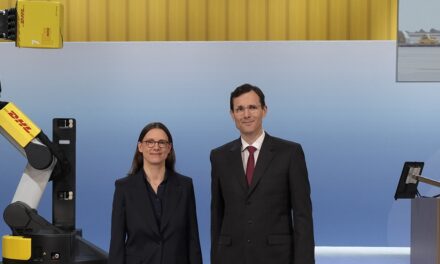
Casting a World Net Deutsche Post is going public, but the move to the stock market has only raised new questions about where the fast-growing logistics giant is heading next
eutsche Post World Net expects to crown its spectacular metamorphosis from lumbering, underperforming, overstaffed postal monopoly to dynamic global transport operator on Nov. 20 with Europe’s biggest initial public offering of the year. But the high-profile IPO will be a sideshow for the German giant to piecing together its strategy for fending off its main rivals, United Parcel Service, FedEx and TNT Post Group, which themselves are trying to figure out what to do next. Other transport operators want to know how the Americans, in particular, will retaliate and that has big-volume shippers asking what’s in it for them.
Barely three years ago, Deutsche Post didn’t register in an international air express and parcel delivery market that was sewn up by the Big Four – UPS, FedEx, TPG and DHL Worldwide Express – whose hefty investments had created huge barriers to entry. Nothing stood in the way of UPS and FedEx dominating the global logistics market, until a 500-year-old European post office decided to take on these American corporate icons.
Three years and $5 billion later, Deutsche Post looks like it has pulled it off, building one of the world’s most impressive transport portfolios, spanning the giant freight forwarding operations of Danzas and Air Express International, trucking companies, parcel delivery businesses and express firms across Europe. And it topped this off on the eve of its IPO by announcing its intention to boost its 25 percent stake in DHL International, the global express carrier, to a controlling 51 percent.
Deutsche Post won’t benefit directly from the public offering as all the proceeds from the sale of between 25 percent and 33 percent of its equity will go to the German government. Still, there is more to come. Chief Financial Officer Edgar Ernst says the company can raise “a few billion” euros from the sale of non-core assets, mainly real estate, to fund fresh acquisitions.
That’s got the competition guessing about the next target, with many in the business saying the logic of Deutsche Post’s past deals suggests it will do the obvious and try to convince Lufthansa to part with Lufthansa Cargo, its supposedly stand-alone air freight business that may soon become a non-core activity to flying passengers. Adding Lufthansa Cargo, the world’s second largest air cargo carrier after FedEx, to DHL, would catapult Deutsche Post into a new league.
Far-fetched as it sounds – and there is plenty of skepticism that a portion of an airline’s ongoing operations can be separated out – the deal may be doable. Earlier this year, Lufthansa Cargo and Deutsche Post pooled their joint 50 percent stake in DHL into a new joint venture, Aerologic, providing a springboard for a deeper alliance or merger.
Traditional carriers such as Lufthansa, Air France and KLM Royal Dutch Airlines have pulled out all the stops to claw back markets lost to integrators as they meet major shippers’ demand for seamless door-to-door delivery. To little effect, however. So why not alliances with mail companies and freight forwarders or integrators themselves, something Deutsche Post can now provide under a single roof following its DHL coup?
Deutsche Post and its rivals are aiming at a mega-market: logistics accounts for an estimated 11.5 percent of Europe’s gross domestic product, significantly above its 10.5 percent share of America’s output.
But compared with other key sectors such as automobiles, chemicals, aerospace and oil, it’s extremely fragmented, with no dominant players able to offer all transport modes and services. The top 10 transport and logistics firms in Europe account for only 15 percent of the European market, according to Bear Stearns, the U.S. investment bank. The logistics industry is hard-pressed then to give the world’s top 500 multinationals, which control around 40 percent of world trade, what they want: a one-stop solution for their entire supply chain – not just shipping goods from factory floor












